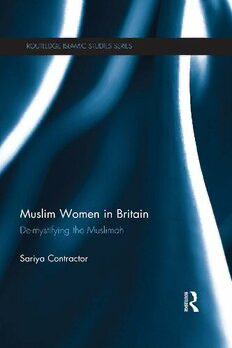
Muslim Women in Britain: De-mystifying the Muslimah PDF
Preview Muslim Women in Britain: De-mystifying the Muslimah
Muslim Women in Britain Perceptions of Muslim women in Western society have been shaped by his- torical and sociological conditions such as colonialism, patriarchy and Orientalism.InMuslimWomeninBritain,SariyaContractorseekstoreinstate theMuslimahasastorytellerwhotellsherownstory. An exploration of the lives of British Muslim women, this book examines issues of femininity, Britishness, inter-communal relations and social cohe- sion. Presenting the reader with incisive narratives of Muslim women on familiar topics such as the hijab, Muslim women in the media and feminist debate, particularly in a Western context, SariyaContractor makes avaluable contribution to the existing literature on Islamic studies, social anthropology, feminist philosophy and social cohesion. Presenting a complex and nuanced retelling of Muslim women’s realities as explored through their own voices, stories and experiences, this book will be ofinterestto scholars and students ofIslamicstudies,Women’sstudies,Social AnthropologyandSociologyseekingafreshperspectiveonMuslimwomenin Britain. Sariya Contractor is a convert to Islam and a sociologist at the University of Derby, specialising in the sociologyof religion. Routledge Islamic Studies Series This broad ranging series includes books on Islamic issues from all parts of the globe and is not simply confined to the Middle East. Historians, State and Politics in Twentieth Century Egypt Contesting the Nation Anthony Gorman The New Politics of Islam Pan-Islamic Foreign Policy in a World of States Naveed Shahzad Sheikh The Alevis in Turkey The Emergence of a Secular Islamic Tradition David Shankland Medieval Islamic Economic Thought Filling the Great Gap in European Economics S.M. Ghazanfar The West and Islam Western Liberal Democracy versus the System of Shura Mishal Fahm al-Sulami The Regency of Tunis and the Ottoman Porte, 1777–1814 Army and Government of a North-African Eyâlet at the End of the Eighteenth Century Asma Moalla Islamic Insurance A Modern Approach to Islamic Banking Aly Khorshid The Small Players of the Great Game The Settlement of Iran’s Eastern Borderlands and the Creation of Afghanistan Pirouz Mojtahed-Zadeh Interest in Islamic Economics Understanding Riba Abdulkader Thomas Muslim Diaspora Gender, Culture and Identity Edited by Haideh Moghissi Human Conscience and Muslim-Christian Relations Modern Egyptian Thinkers on al- d.am-ır Oddbjørn Leirvik Islam in Nordic and Baltic Countries Göran Larsson Islam and Disability Perspectives in Theology and Jurisprudence Mohammed Ghaly Producing Islamic Knowledge Transmission and Dissemination in Western Europe Edited by Martin van Bruinessen and Stefano Allievi Political Liberalism in Muslim Societies Fevzi Bilgin Shari’a Compliant Microfinance S. Nazim Ali Muslim Women Online Faith and Identity in Virtual Space Anna Piela Early Orientalism Imagined Islam and the Notion of Sublime Power Ivan Kalmar Muslim Women in Britain De-mystifying the Muslimah Sariya Contractor Muslim Women in Britain De-mystifying the Muslimah Sariya Contractor Firstpublished2012 byRoutledge 2ParkSquare,MiltonPark,Abingdon,Oxon,OX144RN SimultaneouslypublishedintheUSAandCanada byRoutledge 711ThirdAvenue,NewYork,NY10017 RoutledgeisanimprintoftheTaylor&FrancisGroup,aninformabusiness ©2012SariyaContractor TherightofSariyaContractortobeidentifiedasauthorofthisworkhas beenassertedbyherinaccordancewithsections77and78ofthe Copyright,DesignsandPatentsAct1988. Allrightsreserved.Nopartofthisbookmaybereprintedorreproducedor utilisedinanyformorbyanyelectronic,mechanical,orothermeans,now knownorhereafterinvented,includingphotocopyingandrecording,orin anyinformationstorageorretrievalsystem,withoutpermissioninwriting fromthepublishers. Trademarknotice:Productorcorporatenamesmaybetrademarksor registeredtrademarks,andareusedonlyforidentificationandexplanation withoutintenttoinfringe. BritishLibraryCataloguinginPublicationData AcataloguerecordforthisbookisavailablefromtheBritishLibrary LibraryofCongressCataloginginPublicationData Contractor,Sariya. MuslimwomeninBritain:de-mystifyingtheMuslimah/ SariyaContractor. p.cm.--(RoutledgeIslamicstudiesseries) Includesbibliographicalreferencesandindex. 1.Muslimwomen--GreatBritain.I.Title. HQ1170.C762011 305.4806970941--dc23 2012002824 ISBN:978-0-415-66996-2(hbk) ISBN:978-0-203-10630-3(ebk) TypesetinTimes byTaylorandFrancisBooks Ayesha’s voice On herself: I am a student, I have a lot to experience in life and I am still young. So I have a lot to achieve and I have great ambitions and dreams. InshaAllah [if God wills] I can fulfil them. On women’s rights: I think they [rights] are very important. You lose your personality, your identity if you don’t have rights. Identity is very important in this world. On patriarchy: I think sometimes men … try to take these [women’s] rights to make it easier for them. You know, if women don’t have expectations, it becomes easier for them. On women fighting for their rights: I want to convey to Muslim sisters what- ever age they may be, whatever ethnicity, that Islam is not oppressing us, it gives us the opportunity to have our voice heard and to speak our mind. I have always been fighting for sisters, I have always had that thing, and I question sometimes, ‘Whydomen getopportunitiesandwomen don’t?’Maybethere isa test inthis andmaybe there isanother test that Allah hasgiven us– tofightfor our rights maybe. On dialogue: It is good if we get to talk to each other, maybe then we will see whywebehaveinaparticularmanner.Maybeitwillbreakthebarrierandhelp build bridges [ … ] we are all human and if we communicate then there is a sense of security. [ … ] Even within Muslims we have gaps between different ethnicities. We need to fill these gaps and realise that we go through the same things in life. Any difficulties that we have, we should talk to each other. You know, a problem shared is a problem halved. On the media: In conclusion, from my point of view and from my experience, I feel that women with the hijab, the jilbab and even the niqab [various forms of covering used by Muslim women], I don’t think that they are oppressed. I really want to get this point across that we are not oppressed or anything. It comes from our desires and belief that we want to do this for the sake of Allah. I hope to see this message portrayed in the media, maybe my speech will be there. I really hope that they can clear their minds that we are not oppressed. Ayesha1 insisted she would participate in my work although she was extre- mely ill, because she felt it was important that she make her voice heard, if onlytoclarifymisconceptionsaboutIslam.Shediedofcanceron18November 2009.Shewas20.ThisbookisdedicatedtoAyesha. May you be eternally blessed Ayesha, may your voice continue to be heard. Ameen Contents List of figures xi Foreword by Dr Alison Scott-Baumann xii Acknowledgments xiv Note on terms, translations and transliterations xvi Introducing Muslim women’s voices 1 PARTI Giving voice 13 1 The historicity of modern stereotypes 15 2 Working with Muslims (women): methodological possibilities 37 PARTII Taking voice 55 3 Islam versus Muslim culture: the Muslim woman’s voice 57 4 ‘Ain’t I awoman?’: ‘constructing’ Muslim women 69 5 Women’s narratives of the hijab 81 6 Islamic feminisms 94 7 Metaphors, Muslim women and ‘the media’ 107 PARTIII Hearing voice 119 8 Challenging ‘Muslim women’stereotypes: ‘She’s just like my friend Bess’ 121 9 Feminine universality? Muslim sisters in the sisterhood 133
